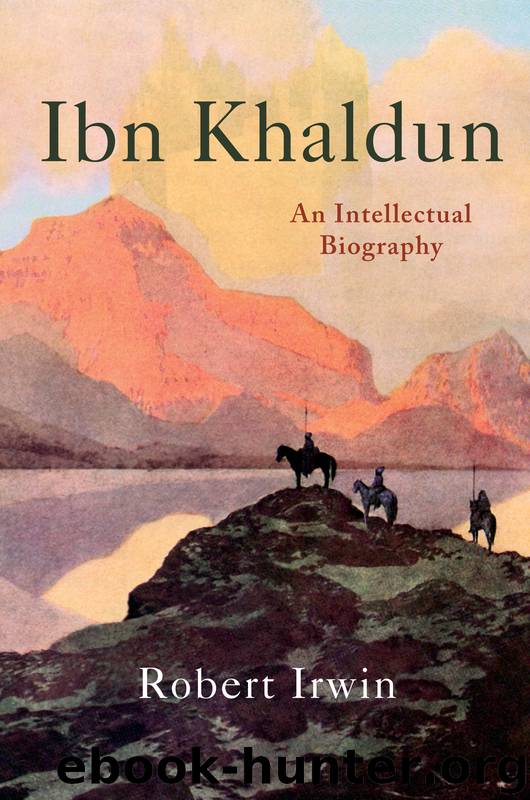Ibn Khaldun by Irwin Robert

Author:Irwin, Robert
Language: eng
Format: epub
Publisher: Princeton University Press
Published: 2018-03-14T04:00:00+00:00
CHAPTER SEVEN
Messages from the Dark Side
Initially the Muqaddima set out to explore the underlying forces behind history and the correct way of understanding them. But the scope of the work expanded as Ibn Khaldun worked on it and so it became looser and baggier and hence the Muqaddima includes extensive discussions of such things as secretarial skills, dreams, mystical experiences, the occult, and the principles of pedagogy, as well as a treasury of verses that Ibn Khaldun particularly admired. These things are not strictly relevant to the understanding of historical processes. They were perhaps an advertisement for himself.
The Muqaddima comes close to becoming a comprehensive encyclopedia. It was indeed produced in an age when encyclopedias were in fashion in the Arab world, particularly in Mamluk Egypt and Syria. For example, the Nihayat al-arab fi funun al-adab (The Heart’s Desire in the Arts of Culture) by a former financial administrator, Shihab al-Din al-Nuwayri (1279–1332), is a vast guide to the cosmos, humans and their government, and literature, animals, plants, and history—particularly history. Of the encyclopedia’s thirty-one volumes, twenty-one are devoted to history. It was so exhaustive in its coverage that it amounted to a fantasy version of the required culture of a scribe. To take another example, the Masalik al-absar fi mamalik al-amsar (Paths of Perception through the Metropolitan Dominions) by a chancery clerk, Ibn Fadl Allah al-‘Umari (1301–49), is an encyclopedia in fourteen volumes containing all the information that a secretary might need to know. Al-‘Umari devoted a lot of pages to geography and history. One is tempted to ask what Arabic culture was there in the fourteenth and fifteenth centuries other than that of the scribe. Centuries earlier, in the ‘Abbasid period, al-Mas‘udi’s chronicle Muruj al-dhahab also had some of the qualities and scope of an encyclopedia.
Although Ibn Khaldun has been presented in recent centuries as the precursor of Comte, Durkheim, and Marx, it must be remembered that he inhabited a different and darker world than the one known to European economists and sociologists. It was one in which plants, stones, and planets had talismanic powers: resemblance “made possible knowledge of things visible and invisible, and controlled the art of representing them. The universe was folded in upon itself: the earth echoing the sky, faces seeing themselves reflected in the stars, and plants holding within their stems the secrets that were of use to man.”1 It was also a world haunted by spirits and presided over by an all-seeing God. Consequently Ibn Khaldun was obsessed with the occult.
Download
This site does not store any files on its server. We only index and link to content provided by other sites. Please contact the content providers to delete copyright contents if any and email us, we'll remove relevant links or contents immediately.
Fanny Burney by Claire Harman(26603)
Empire of the Sikhs by Patwant Singh(23086)
Out of India by Michael Foss(16853)
Leonardo da Vinci by Walter Isaacson(13336)
Small Great Things by Jodi Picoult(7143)
The Six Wives Of Henry VIII (WOMEN IN HISTORY) by Fraser Antonia(5515)
The Wind in My Hair by Masih Alinejad(5095)
A Higher Loyalty: Truth, Lies, and Leadership by James Comey(4964)
The Crown by Robert Lacey(4817)
The Lonely City by Olivia Laing(4802)
Millionaire: The Philanderer, Gambler, and Duelist Who Invented Modern Finance by Janet Gleeson(4478)
The Iron Duke by The Iron Duke(4356)
Papillon (English) by Henri Charrière(4274)
Sticky Fingers by Joe Hagan(4199)
Joan of Arc by Mary Gordon(4112)
Alive: The Story of the Andes Survivors by Piers Paul Read(4033)
Stalin by Stephen Kotkin(3966)
Aleister Crowley: The Biography by Tobias Churton(3640)
Ants Among Elephants by Sujatha Gidla(3467)
